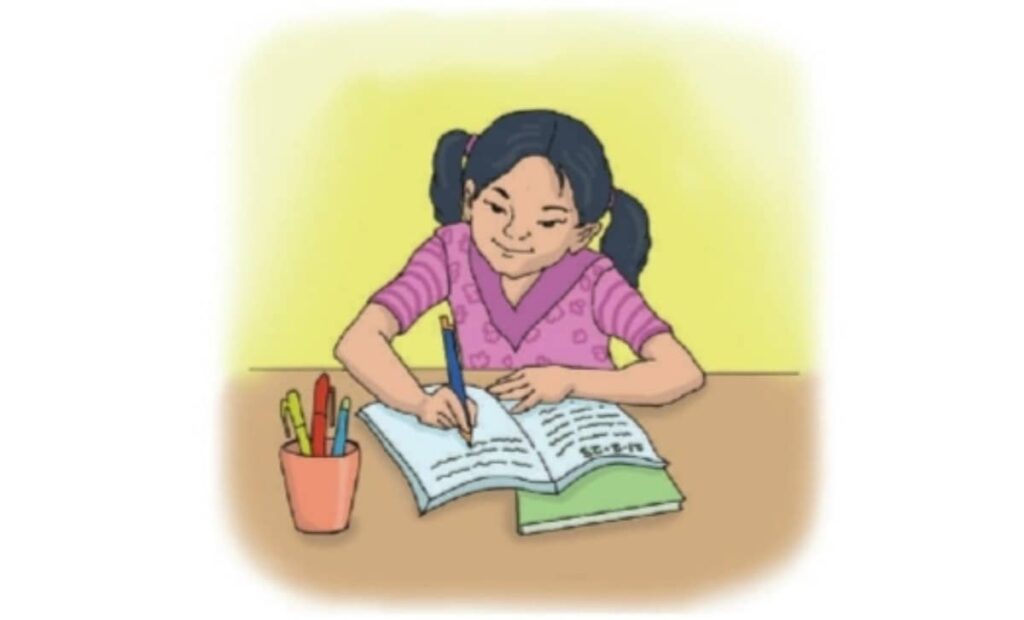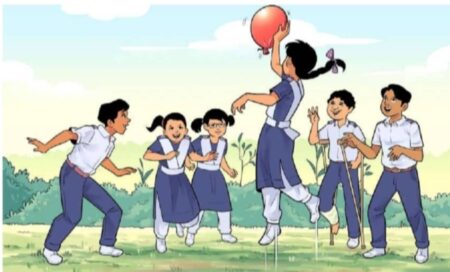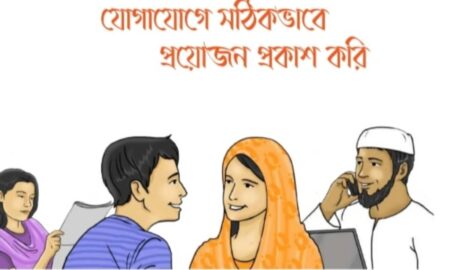
In this post, we’ll learn about Our Language Movement, which is a topic from Chapter 14, English Subject, Class 7.
Important Vocabularies For This Lesson
- Memory – স্মৃতি
- Frequently – ঘনঘন
- Entrance – প্রবেশদ্বার
- Agreement – চুক্তি
- Memorable – স্বরণীয়
- Declaration – ঘোষণা
- Preserve – সংরক্ষণ করা
- Outraged – ক্ষুব্ধ
- Significant – গুরুত্বপূর্ণ
14.1 | Read the following page from Shaoli’s diary and list the underlined sentences in the appropriate column in pairs/groups. Also, describe your reason. One is done for you.
Ans:
| The focus of the sentence is on the doer or subject | The focus of the sentence is on the action |
| Example sentence: She wrote her memory of that day in her diary. Reason: Here the focus is on who wrote the memory. | Example sentence: The school building was painted white and pink. Reason: Here the focus is on the painting not who did the painting. |
| Our headteacher welcomed us at the entrance. Reason: Here the focus is on who welcome us. | Many posters were hung on different walls. Reason: Here the focus is on the posters that are hung, not who hung. |
| I met my friends. Reason: Here the focus is on who met my friends. | We were asked to wear mask and wash our hands frequently Reason: Here the focus is on wearing mask, not who asked to do so. |
| I spent a really good time with my teachers and friends. Reason: Here the focus is on who spent a good time. | Special tiffin was served. Reason: Here the focus is on what was served, not who served. |
14.3 | Now, identify the sentences in the following table as active or passive. And write why you think the sentences are active or passive voice. One is done for you.
Ans:
| Sentence | Active or Passive? | Why active/passive voice? |
| 1) I got ready for school. | Active | Because the subject (I) is active in the sentence. She did the action got ready for school. |
| 2) The school building was painted white and pink. | Passive | Because the focus is on the action (the school building was painted), not on the docr. |
| 3) Many posters were hung on different walls. | Passive | Because the action is emphasized/focused in the sentence. Something has happened – posters were hung. |
| 4) We were asked to wear musk and wash our hands frequently. | Passive | Because the action is emphasized/focused in the sentence. Something has happened we were asked. |
| 5) Our headteacher welcomed us at the entrance. | Active | Because the subject ( Our headteacher) is active in the sentence. He did the action of welcoming. |
| 6) I met my friends. | Active | Because the subject (1) is active in the sentence. She did the action met her friends. |
| 7) Special tiffin was served. | Passive | Because the action is emphasized focused in the sentence. Something has happened tiffin was served. |
| 8) I spent a really good time with my teachers and friends. | Active | Because the subject (1) is active in the sentence. She did the action of spending time. |
14.6 | Now, read the notes on Voice again and circle the correct answers in pairs/groups:
Ans:
a. Voice tells us the relationship between _____
i) Noun, pronoun and verb
ii) Subject, pronoun and verb
iii) Subject, verb and object √
b. In active voice, the focus is on _____.
i) who is doing? √
ii) what is doing?
iii) how is doing?
c. To write an active sentence, which sentence structure will you follow?
i) S+O+V
ii) S+V+O √
iii) O+V+S
d. To write a passive sentence, which sentence structure will you follow?
i) S+Agent+V
ii) Agent+S+V
iii) S+V+Agent √
e. The ____ of an active voice becomes the _____ of a passive voice.
i) Subject, object
ii) Object, subject √
iii) Agent, subject
f. In a passive voice, the main verb is always in the ____.
i) Present perfect
ii) Past perfect
iii) past participle √
g. In a past continuous tense passive voice, the auxiliary verb ‘was’ will be changed into-
i) was been
ii) was being √
iii) was being been.
h. To find the object of a verb, you will ask the verb to ____.
i) who and whom
ii) what and who
iii) what and whom √
i) ‘My father’ is a/an ____ object.
i) direct
ii) indirect √
iii) auxiliary
j. The object form of ‘they’ will be-
i) their
ii) them √
iii) those
14.7 | Now, read the text given below and match the words with their meanings in the following table in pairs/groups.
Ans:
| Word | Meaning |
| 1) Protest | d) To show or express strong disagreement |
| 2) Eventually | e) In the end |
| 3) Peak | g) The highest point |
| 4) Procession | a) A group of people move forward in line |
| 5) Wounded | f) Injured |
| 6) Outraged | i) A feeling of anger and shock |
| 7) Compelled | c) Forced to do something |
| 8) Commemorate | j) To show honour to the memory of an important event in a special way |
| 9) Acknowledged | h) Known or accepted by many people |
| 10) Warrior | b) A fighter who shows great courage |
a) In which language did the majority of the people of East Pakistan speak?
b) Against which declaration did the people of East Pakistan start protesting?
c) What happened on 21st February 1952?
d) Did any other country sacrifice lives for their mother tongue?
e) When was 21st February declared as “International Mother Language Day”?
f) Do you observe ‘International Mother Language Day’ at school? If yes, why do you observe?
Ans:
Student 1: In which language did the majority of the people of East Pakistan speak?
Student 2: Majority of the people of East Pakistan spoke in Bangla.
Student 3: Against which declaration did the people of East Pakistan start protesting?
Student 1: Pakistani rulers declared Urdu as the only state language and against this declaration the people of East Pakistan started protesting.
Student 2: What happened on 21 February 1952?
Student 3: On 21st February of 1952, a group led by the students took out a procession on the roads of Dhaka breaking the curfew and demanding Bangla to be declared as one of the state languages of Pakistan. When the procession reached Dhaka Medical College, police fired bullets and many had been wounded and many had died.
Student 1: Did any other country sacrifice lives for their mother tongue?
Student 2: No. They did not.
Student 3: When was 21 February declared as ‘International Mother Language Day?
Student 1: In 1999.
Student 2: Do you observe International Mother Language Day’ at school? If yes, why do you observe?
Student 1: Yes, we observe ‘International Mother Language Day’ at school. We observe it to commemorate the language movement and those who laid down their lives for the right of their mother language.
14.9 | Now in pairs/groups, read the passage again and list the underlined sentences in the right column and change them into the opposite voice (active-passive or passive to active). Then, exchange your copies with other pairs/groups to check. One is done for you.
Ans:
| Active Voice | Passive Voice |
| 1) People observe 21 February with pride in Bangladesh | 1. 21 February is observed with pride in Bangladesh. |
| 2) People knew Bangladesh as East Pakista. | 2. Bangladesh was known as East Pakistan |
| 3) The Pakistani rulers declared Urdu as the only state | 3. Urdu was declared as the only state language by the Pakistani rulers |
| 4) Police fired bullets at the peaceful group of protesters. | 4. Bullets were fired at the peaceful group of protesters by Police. |
| 5) This made the whole nation outraged and the movement became stronger. | 5. The whole nation was made outraged by this and the movement became stronger |
| 6) People compelled the ruler to declare Bangla as one of the state languages of Pakistan | 6. The ruler was compelled to declare Bangla as one of the state languages of Pakistan. |
| 7) The whole world acknowledged it. | 7. It was acknowledged by the whole world. |
| 8) People sacrificed their lives for the tights of their mother language. | 8. Lives were sacrificed by people for the rights of their mother language. |
| 9) Eventually, people all over the world recognized the sacrifice of the language warriors. | 9. Eventually, the sacrifice of the language warriors. was recognized all over the world |
14.10 | Work in a group of 5-6.
Read the situations given below. Then discuss the focus of the situations (what is important here to talk about the doer or the action? Will you use active or passive sentences?) Later, describe them using active or passive voice. And tell your reason to choose the voice.
Ans:
Situation 1:
I think to tell who is doing is important here. In the sentence the subject (the teacher) is active and he/she performs the action
Situation 2:
I think to tell who is making the poster is important here. The focus should be on the doer. So, I will use an active sentence.
Situation 3:
I think to tell what are the instructions is important here. Here the focus should be on the action, not on the subject or doer. So I will use a passive sentence.
Situation 4:
I think to tell what I have for tiffin is important here. I would rather focus on the tiffin given, not on who gave it. Therefore, I will use passive voice.
Situation 5:
I think to tell who worked for the bridge is important. here. I will use an active voice and the focus would be on the doer.


